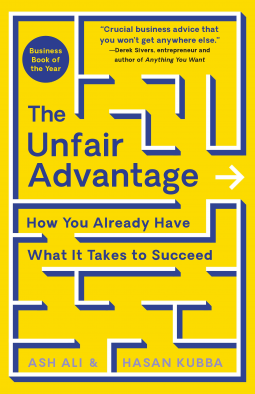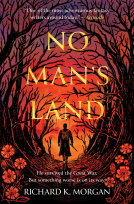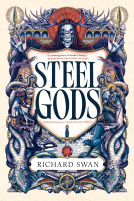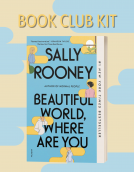
The Unfair Advantage
How You Already Have What It Takes to Succeed
by Ash Ali; Hasan Kubba
This title was previously available on NetGalley and is now archived.
Send NetGalley books directly to your Kindle or Kindle app
1
To read on a Kindle or Kindle app, please add kindle@netgalley.com as an approved email address to receive files in your Amazon account. Click here for step-by-step instructions.
2
Also find your Kindle email address within your Amazon account, and enter it here.
Pub Date Jun 07 2022 | Archive Date Jun 21 2022
Talking about this book? Use #TheUnFairAdvantage #NetGalley. More hashtag tips!
Description
The winner of the UK's Business Book of the Year Award for 2021, this is a groundbreaking exposé of the myths behind startup success and a blueprint for harnessing the things that really matter.
What is the difference between a startup that makes it, and one that crashes and burns? Behind every story of success is an unfair advantage.
But an Unfair Advantage is not just about your parents' wealth or who you know: anyone can have one. An Unfair Advantage is the element that gives you an edge over your competition.
This groundbreaking book shows how to identify your own Unfair Advantages and apply them to any project. Drawing on over two decades of hands-on experience, Ash Ali and Hasan Kubba offer a unique framework for assessing your external circumstances in addition to your internal strengths. Hard work and grit aren't enough, so they explore the importance of money, intelligence, location, education, expertise, status, and luck in the journey to success. From starting your company, to gaining traction, raising funds, and growth hacking, The Unfair Advantage helps you look at yourself and find the ingredients you didn't realize you already had, to succeed in the cut-throat world of business.
Advance Praise
“Crucial business advice that you won’t get anywhere else.”
—Derek Sivers, entrepreneur and author of Anything You Want
“A fast-paced read with excellent insights from a remarkable entrepreneurial story.”
—Daniel Priestley, author of Entrepreneur Revolution
“What a masterful and thought-provoking book: a must for every entrepreneur regardless of the stage of your journey.”
—Byron Cole, Business Growth Expert and author of Self Made
“In a no-nonsense approach, this book shows you the truth that business and life aren't fair, and goes into the methods and practices to let you take full advantage of your unique skills and assets.”
—Rune Sovndahl, founder of Fantastic Services
“The Unfair Advantage breaks down how people from all walks of life and backgrounds can achieve unfair advantages in their entrepreneurial journey or career. An indispensable handbook for the masses.”
—Dion McKenzie, founder of Colorintech and Tech Investor
Available Editions
| EDITION | Other Format |
| ISBN | 9781250280527 |
| PRICE | $27.99 (USD) |
| PAGES | 256 |
Average rating from 18 members
Featured Reviews
One of the key takeaways after having read The Unfair Advantage by Ali Ash and Kubba Hasan is how I can translate the framework to use as a social media influencer. To leverage my own identity, my personal brand, and unique lens to draw inspiration for social posts that is consistent, resonates with followers that are like-minded or curious about what I find interesting and worthy of a mention! So while this book is intended for business startups, I would argue that influencers, who are personal branding startups, can glean a nugget or two from understanding how to tap into ones Unfair Advantage.
 Librarian 804685
Librarian 804685
Money, intelligence, location, luck, education, expertise, and status are often all required in some combination for success, and this book goes into each piece and how you can pivot it as an entrepreneur.
Thank you to NetGalley and St. Martin's Press for the ARC.
 Srikanth R, Reviewer
Srikanth R, Reviewer
This is an interesting book that delves into the topic of innate advantages that one might have prior to starting their own venture and how that will help them have an edge over others in the game. Once this concept has been accepted, then the next step is to figure out what one's unfair advantages are. These would be unique skills and also qualities that one enjoys using professionally. Overall, a good book with a fresh perspective.
 Paul V, Reviewer
Paul V, Reviewer
While I"m not an entrepreneur and this book does not contain all the answers, this seems to have some very good ideas to improve one's chances creating a startup. It seems like a good addition to the books creators should read. Recommended.
Thanks very much for the free ARC for review!!
 Matt K, Reviewer
Matt K, Reviewer
I like the premise of this book. Startup success isn't just a matter of having a great idea and working hard. Those are (usually) necessary, but they're not sufficient. You need an edge. That could be having money (yes, you can start a business with no cash, but it's much less likely to succeed.) It could be having special knowledge about your business and your market. It could be just being in the right place at the right time (location, location, location!). It could be having the right connections. It could be pure luck, plain and simple. Without at least one of these, no matter how hard you work, or how good your idea is, you're going to struggle.
The authors pull no punches. If you're going to commit to the life of an entrepreneur, you need to give yourself every possible advantage. Start with an honest review of all those factors, and ask yourself, have you got an unfair advantage? If not, how can you give yourself one? How can you make customers, suppliers, employees, and investors interested in you, rather than your competition?
It's often uncomfortable reading, but it's something all would-be entrepreneurs need to take on board before they plunge headlong into startup life. It's easy to read and accessible, and you can rip through it in a weekend. I just wish they could spell Zuckerberg correctly.
<i>I received a free copy from the publisher in return for a review.</i>
 Louise F, Reviewer
Louise F, Reviewer
With THE UNFAIR ADVANTAGE, Ash Ali and Hasan Kubba declare loud, clear, and bold that success for a start-up--any enterprise--is based on the individual strengths, aptitudes, and resources of the individuals involved in the enterprise. Specifically, success is based upon identifying and leveraging your unique expertise and capabilities that possibly seem obvious or are taken for granted. Creating a business takes more than a big idea, drive, grit, youth, whatever magic fairy dust supposedly must be sprinkled. Throughout this compelling read, Ali and Kubba hammer home the point that you already have what it takes to succeed -- knowing your particular blend of genius and capabilities enables you to use it. Frankly, they had me at the first chapter "LIFE IS UNFAIR" -- a statement my father pronounced whenever we children complained about our challenges. I appreciated their candor, straight talk, and friendly, accessible prose in a category full of ego, puffery, and slick slogans. I received an advance copy of this book and these opinions are my own, unbiased thoughts.
 Nancy F, Reviewer
Nancy F, Reviewer
Assess Your Advantages
This book makes the excellent point that everyone has advantages. The important thing is to recognize them and build on your strengths. If your ambition is to start a company or a business, don’t just look at successful people and try to model yourself after them. The authors give you a tool to look at your own advantages and use them to succeed.
Certainly some advantages such as money, family background, education and intelligence to name a few can play a major role in your success, but they are not the determinants. Bill Gates had monetary and family background advantages, but he also had intelligence and drive. The later qualities are what made the difference in his success. The key is to look at yourself honestly and decide what your strengths are then make a plan that will use them.
I think this is an important book for anyone wanting to create a startup. There are many other rules to follow to become a success, but taking advantage of your special gifts is one of the most important.
I received this book from St. Martin’s Press for this review.
 Linda S, Librarian
Linda S, Librarian
THE UNFAIR ADVANTAGE by Ash Ali and Hasan Kubba describes those often-overlooked aspects which could give the reader a competitive edge, particularly in an entrepreneurial, start-up situations. Both Ali, who founded Uhubs, and Kubba, whose TedTalk is linked below, have significant experience in creating and advising start-ups. Their new text begins by acknowledging that life is unfair and that success is a product of hard work and luck. The next sections describes the MILES framework and encourages readers to perform an audit of certain attributes (Mindset, Money, Intelligence and Insight, Location and Luck, Education and Expertise, plus Status) in order to illustrate "How You Already Have What It Takes to Succeed." Finally, they include several chapters which make up a "The Startup Quick Start Guide." THE UNFAIR ADVANTAGE feels like a text which should have an accompanying workbook. Of possible interest to those looking to start their own business, I also think that excerpts or summaries might intrigue some of our business students.
Ted Talk: https://www.youtube.com/watch?v=KMd3_xJ_GzU
 Tara A, Book Trade Professional
Tara A, Book Trade Professional
Have you ever wondered why one company succeeds and another fails? As a serial entrepreneur, I'm well-acquainted with how stressful starting a business can be. And the statistics regarding small business failure rates is the stuff of nightmares for any small business owner.
Yet the authors of this book have assessed numerous startups to determine what causes some to succeed and others to fail. Often it comes down to the founder's "unfair advantage." Unfair advantages have to do with the founder's access to money, intelligence, location, luck, education, expertise, and status.
As the book presents numerous case studies of how these factors have influenced the success of well-known "unicorn" companies, they demonstrate how the founders' unfair advantages played a role in the companies' results.
Overall, it was a very interesting and engaging book. But the advance review copy I read was still in serious need of editing. With constant references to "Mark Zuccurburg," it made it hard to trust that the rest of the fact-checking was accurate. (My review copy was downloaded three weeks before the release date.) I am hoping that such glaring issues were caught and corrected prior to publication.
Regardless, the concepts taught in the book were demonstrated effectively, and I found it to be an engaging book to read.
Thanks to Ash Ali, Hasan Kubba, St. Martin's Press and NetGalley for an advance review copy.
 Erica W, Reviewer
Erica W, Reviewer
Written to help entrepreneurs in their early stages, The Unfair Advantage explains what the authors believe it takes to be successful in any new business. Whether a lifestyle or hyper-growth startup, the advice within this text will empower all readers.
Each chapter is complete with embedded case studies in a professional yet conversational tone. Illustrating the elusive traction needed to succeed, the case studies and the authors' commentary emphasize the role and strength of the unfair advantages we all have.
From meritocracy to fatalism, The Unfair Advantage speaks of the myths we all believe and eloquently refutes them.
Highly recommended reading for all entrepreneurs regardless of their status or business type.
 Amanda C, Reviewer
Amanda C, Reviewer
This was a really great, motivational book. It had me jotting down notes, brainstorming how to monetize my talents and interests, and generally motivated. I also really enjoyed the conversational writing style. I tend to get bored by "business jargon" and really enjoyed how this kept the topics and advice moving. It felt more like having a business meeting at a coffee shop with some really chill innovators, rather than a stiff business meeting at a restaurant I can't afford. Overall, would definitely recommend this book for entrepreneurs, influencers, and those who are looking to make their mark with new ideas.
Readers who liked this book also liked:
We Are Bookish
General Fiction (Adult), Romance, Women's Fiction
We Are Bookish
General Fiction (Adult), Literary Fiction, Women's Fiction


















